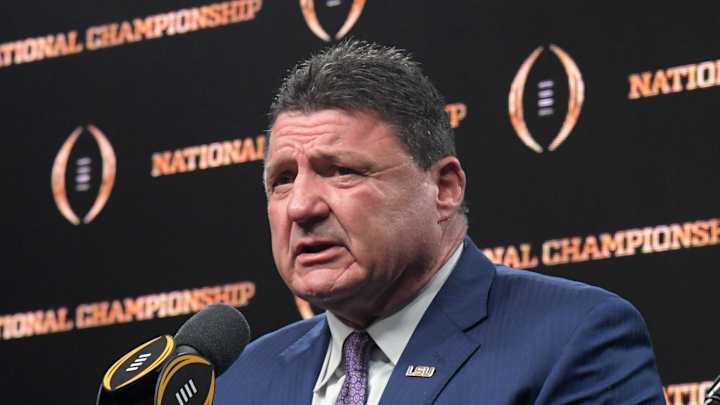Ed Orgeron Grieving With His Nation, Players Over George Floyd's Death: 'It's Terrible'

Over the last few days, Ed Orgeron’s phone buzzed more than normal. For Orgeron, one of the nation’s elite college football recruiters and the head coach of the reigning national champion LSU Tigers, an active phone isn’t something new. But this was different. Messages flooded in from his former players reacting to a nationwide upheaval over the death of George Floyd, an unarmed black man who died May 25 while pinned between concrete and the knee of a white Minneapolis police officer.
“My players and former players are hurting, and they let me know they’re hurting,” Orgeron says in an interview Tuesday with Sports Illustrated. “When they’re hurting, it hurts me. I love all my players like they were my own. I know some are hurting right now, and I totally support them. I will not tolerate racism, and they know it.”
Orgeron is the latest in a long line of high-profile coaches to speak publicly about a movement against police brutality that has gripped America. A mix of peaceful protests and violent riots have broken out in dozens of cities across the country. That includes Louisiana, where thousands marched peacefully through the streets of New Orleans over the weekend. A significant portion of LSU’s roster is from the New Orleans area, a region with a history of racial tension. Many of Orgeron’s current and former players have aired their feelings on social media, most notably the 2019 Heisman Trophy winner Joe Burrow.
The black community needs our help. They have been unheard for far too long. Open your ears, listen, and speak. This isn’t politics. This is human rights.
— Joey Burrow (@JoeyB) May 29, 2020
On Tuesday, in his first meeting with the team since the COVID-19 pandemic suspended on-campus activities, the coach addressed the movement with his players before he spoke to SI. Orgeron wished to first deliver a message to his team, he says, before giving one to the general public. “I told them my feelings, which stays in house, but they know I will not tolerate racism,” he says. “Everybody has a right to voice their opinion. We’re not going to stop that. I told them to be careful.”
Before Orgeron addressed his team Tuesday, he gave the floor to a special guest: Reggie Berry, a lieutenant with the LSU Police Department whose father was the first black police officer at the department in which his son now works. Hassell Berry Jr. patrolled LSU’s campus for 15 years starting in June 1968.
For Orgeron, race issues run deep. He is native Cajun, an ethnic group from South Louisiana that before recently was the target of persecution. It took more than 200 years—and a lawsuit—for the U.S. government to recognize them as a national ethnic group in 1980, and in the early 20th century, attempts were made by American teachers to suppress their language. Orgeron’s ancestors were French-speaking Acadians whom the British forced from their Nova Scotia home in the mid-1700s. They were sent fleeing to French-settled Louisiana, establishing a base on the bayou and later developing a reputation as experts at the seafood and oil field industries.
On Tuesday, Orgeron declined to speak about the plight of Cajuns—“This is not about that,” he says—instead focusing his support for those angry, frustrated and saddened players, former players and co-workers who have reached out to him. “I have seen the incident,” Orgeron says. “I think it’s terrible. I just want the players and former players to know I’m there to support them.”

Ross Dellenger received his Bachelor of Arts in Communication with a concentration in Journalism December 2006. Dellenger, a native of Morgan City, La., currently resides in Washington D.C. He serves as a Senior Writer covering national college football for Sports Illustrated.